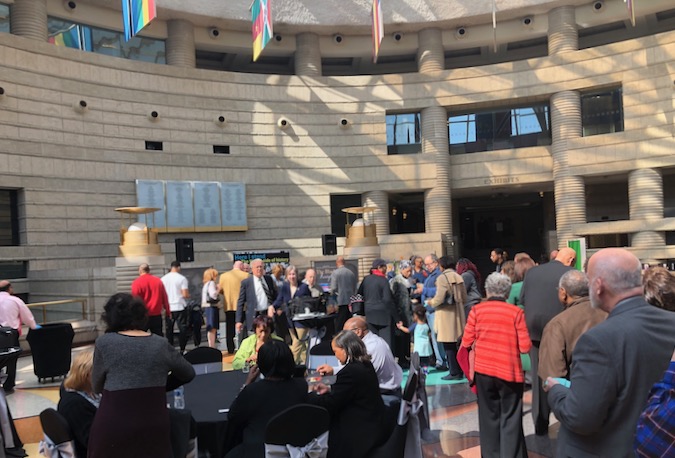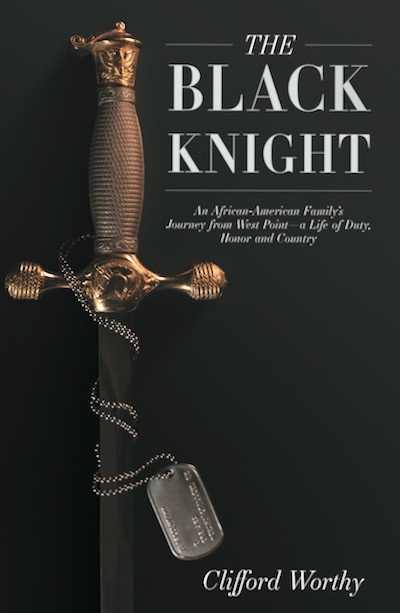
A PROPHET OF UNITY—Like the ancient prophets, retired Col. Clifford Worthy has used his life to call for a return to the values that unite us as Americans, including a strong focus on the men, women and children among us who require special care. When his memoir was launched, a huge crowd gathered at the Charles H. Wright Museum of African American History in Detroit to celebrate Worthy’s long life and his influential storytelling in The Black Knight.
.
EDITOR’s NOTE—As we move through a week of anxiety in America that none of us have experienced at least since the aftermath of the 9/11 attacks two decades ago, we are offering an eloquent appeal—you might think of it as a classic Psalm crying out for help and hope—from one of America’s true heroes: retired Col. Clifford Worthy, the oldest living Black graduate of West Point at age 92.
“I’ve been writing poetry for years—sometimes just to have fun about something that amuses me and sometimes to express much more serious concerns about what’s happening in our world,” Col. Worthy told me this week. He was describing a remarkable 3-ring binder that he sent to my home—a folder that held dozens of his poems, which he invited us to share occasionally in ReadTheSpirit magazine. On the very first page of that binder was this new poem he wrote as a personal appeal to Americans to remember our deepest values.
Col. Worthy has faced fear many times in his life, whether confronting dire crises in his own family or warfare in the deadly jungles of Vietnam. He never wavered, as he described in his memoir The Black Knight. His courage stems from his laser focus on values that were engrained in him at West Point—duty, honor and country—all resting on a bedrock Christian faith that has sustained his family through generations of life-and-death challenges.
“I can’t think of a more timely poem to share with readers in this election week,” I told him, then I asked, “Col. Worthy, when you end this poem reminding us of the ‘Glory Road,’ how do you hope readers will understand that phrase?”
He replied that anyone from his faith tradition will know he is pointing to values taught by Jesus—”a road that leads toward fulfillment as we follow the sometimes very difficult path laid out for humanity by Jesus. I like that phrase we’ve used for so long—the ‘Glory Road.’ It’s where we live out these values together. I think we need to be reminded that we share deeper values like this. We’ve got to stop attacking each other. We’ve got to find a way to come together again.”
And here is Col. Worthy’s poem for America—
Or, as Col. Worthy lays out these themes in his poetry, here is:
.
Are Americans’ bindings breaking?
.
By Col. CLIFFORD WORTHY
Author of The Black Knight
Why are Americans’ bindings breaking?
Why does the national character writhe in dishonorable pursuit?
Why is the hope-sump hemorrhaging?
The political spectra refracts into blinding bitterness.
The American Tories tout exclusion by hawking establishmentarianism to justify loveless fences.
Shamelessly they front Jesus as a prop for political footings.
The East corner of their lips eulogizes family values
Even as the West side of those lips embraces spewers of hate.
Rightist religionists rightfully proclaim, “God is Love!”
On Sunday.
While venomously attacking God’s creatures on Monday through Saturday—
Belying the compassion they had just expressed.
Promotion of self-serving labels assigning good and evil and drawing lines:
Lawbreakers wax into heroes.
Money wins no matter the pain.
Ignoble legality muddies moral waters.
Racism—
Racism in the halls
Racism in the boardrooms
Racism in the cities
Racism in the cemetery—
Racism leaches the land.
Otherness!
Otherness!
Otherness!
Partisan effrontery:
Spinning.
Dizzying the truth.
Invasively abusing the guaranteed freedom.
Thumbing noses at the greater good.
Inept leadership in highest places is endorsed by smirking scalawags—
And the people suffer.
Folk of every making have forgotten how to blush.
Making mockery of One Nation Under God.
All trade beauty for ashes.
Jesus knock is unheeded.
Who still travels the Glory Road?
.
.
Care to learn more?
Get a copy of Col. Worthy’s life story, The Black Knight, for yourself—and order more copies for friends and loved ones on your holiday shopping list who are especially interested in stories from our U.S. armed forces. There are many themes in this illustrated memoir, including the challenges Col. Worthy and his wife faced raising a special needs son in an era when professional help for such families was in its infancy.
Clifford Worthy, the great grandson of slaves, was one of the few African-American men of his generation who was accepted and excelled as a Black Knight of the Hudson, a traditional nickname for West Point cadets. Col. Worthy describes his journey to West Point, the many challenges he overcame both in his family and in the U.S. Army, including service in the front lines of Vietnam.
Rick Forzano, former Head Coach of the Detroit Lions praises Col. Worthy’s memoir and his example to all of us. “He has fought his way through virtually every stage in life with his faith in God giving him the necessary strength and courage,” Forzano writes.
And more?
GET IN TOUCH! At 92 and with the distinction of being the oldest living Black graduate of West Point, Col. Worthy receives many requests to appear on podcasts, plus radio, TV and newspaper interviews. He considers each request and has accepted many invitations—so his voice and storytelling already is a popular part of the national conversation. Would you like to get in touch with Col. Worthy to make such a request? Email us at [email protected]
Still more?
Col. Worthy’s life, his memoir The Black Knight and his poetry are rich in references to African American traditions in family and faith—including essential shared experiences like The Great Migration and centuries of Black church and family reunions. If you are not an African-American reader, you will experience his writing at a deeper level if you also have a copy of the Michigan State University School of Journalism’s 100 Questions and Answers about African Americans.

